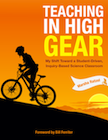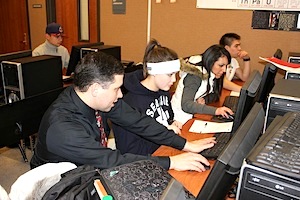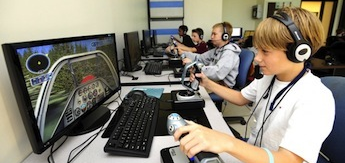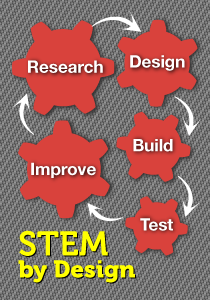What Tweens and Teens Can Teach Us about STEM
Did you see this question that the New York Times asked 13- to 19-year old students on their Learning Network blog recently?
What moments or concepts do you remember best from your education in science, technology, engineering or math, the so-called STEM subjects?
In thinking back (way back, in my case), most of my science and all of my math was seatwork style. Nothing much exciting going on with that. Even endless seatwork couldn’t kill my fascination with science, though, and I loved reading about science, wondering, and imagining. Math frustrated me because, although I easily grasped the procedures, my teacher couldn’t explain why formulas worked and where they came from, or for what purpose I might use the math I was learning.
The science teaching journey
 When I became a science teacher, I began my journey in much the same way Marsha Ratzel describes in her new book, Teaching in High Gear: My Shift Toward a Student-Driven, Inquiry-Based Science Classroom. (What a book! An absolute “must read” for all STEM teachers!) I painstakingly and over time developed the skills needed to be a teacher who could interest and inspire students. Then I continued to grow and developed into a classroom “coach” (as Marsha writes about here). As I learned to facilitate learning rather than deliver learning, I noticed a difference in how my students thought about themselves and their learning.
When I became a science teacher, I began my journey in much the same way Marsha Ratzel describes in her new book, Teaching in High Gear: My Shift Toward a Student-Driven, Inquiry-Based Science Classroom. (What a book! An absolute “must read” for all STEM teachers!) I painstakingly and over time developed the skills needed to be a teacher who could interest and inspire students. Then I continued to grow and developed into a classroom “coach” (as Marsha writes about here). As I learned to facilitate learning rather than deliver learning, I noticed a difference in how my students thought about themselves and their learning.
Maybe that’s why the student responses in this Learning Network blog fascinate me. First, here’s my take on the things that inspired students who were in more traditional settings – much like the beginning of my career. (I’m implying traditional settings based on the background information students gave in these responses.)
- One 8th grade student changed his view on science because of a teacher who used songs and movies to help him remember the formulas and facts that were drilled into him day after day.
- Another 8th grade student remembered spending hours after school every week learning chemistry with her science teacher, who “was an awesome teacher.”
- In 7th grade, a student remembered a great science teacher who was respected as the best teacher in the school by almost all the students. Why? His teaching methods were abstract, funny, and a little outlandish.
- A 3rd grader mentioned a teacher who had a multiplication contest to encourage his students to learn their times tables. She won and became the Multiplication Queen.
- A memorable experience for one middle schooler was the teacher creating a lab where they shaved crayons and used a hot plate to melt them, then cooled them to represent metamorphic rock.
 Most memorable experiences for the “traditional” group involved having an amazing teacher, who was genuinely passionate about what he or she taught, and who made the subject fun. Repeatedly students wrote, “My favorite memory in science was when the teacher would joke around with us.” “I adored math because of my teacher.” They didn’t focus so much on moments and concepts as on teacher qualities and relationships. (Note: There are plenty of exceptions to that sweeping statement. Nonetheless, that trend seemed to hold through the 406 responses.)
Most memorable experiences for the “traditional” group involved having an amazing teacher, who was genuinely passionate about what he or she taught, and who made the subject fun. Repeatedly students wrote, “My favorite memory in science was when the teacher would joke around with us.” “I adored math because of my teacher.” They didn’t focus so much on moments and concepts as on teacher qualities and relationships. (Note: There are plenty of exceptions to that sweeping statement. Nonetheless, that trend seemed to hold through the 406 responses.)
Then there are the STEM students . . .
Now take a look at some typical responses from students who were in courses that they identified as STEM courses. In these courses, teachers are coaches or facilitators. (Note: Some of these students cited Project Lead the Way as the source of their STEM curriculum.)
- A 7th grader remarked, “In engineering I apply science and math to find solutions to real problems. I realize now how much I use math and science in everyday life.”
- Several students mentioned that their STEM work made connections to real life and helped them understand the concepts better. Memorable robotics competitions encouraged many students to tackle real-world problems (e.g. build a prototype toxic waste disposal system).
- One student recalled that he always wanted to give up when something was hard. In his STEM classes he learned to step out of his comfort zone, think outside of the box, and be creative. He surprised himself by being able to figure things out without help.
- Students mentioned that STEM classes led them to discover career choices and an academic focus. One stated that his most memorable moment was the day he figured out what he wanted to do with his life.
- Students also remarked that they learned the value of working together. “If we work together we will be successful, if we don’t help each other we will all crumple.” They were also aware that they were developing leadership skills.
So what are we to make of all this? If my quick and over-simplified take on this is accurate, would it be fair to say that the STEM group was more aware of their learning than they were of their teacher? Certainly STEM students were more prone to talk about what THEY did rather than what their teacher did.
 These kids realized what was happening – they were applying their coursework to real life. They were integrating content and solving real problems. They were being creative and didn’t have to be afraid to mess up and try again. They were learning with a purpose, and they understood that purpose. One student remarked that STEM impacted her life in more ways than she could begin to share, and helped her prepare for college a step ahead of her peers.
These kids realized what was happening – they were applying their coursework to real life. They were integrating content and solving real problems. They were being creative and didn’t have to be afraid to mess up and try again. They were learning with a purpose, and they understood that purpose. One student remarked that STEM impacted her life in more ways than she could begin to share, and helped her prepare for college a step ahead of her peers.
Note: When I say “STEM students,” I mean students who were using an engineering approach to integrate science and math, along with appropriate technologies.
There’s a message here for teachers. If the STEM students are to be believed, they are challenged and inspired by their STEM classes. So growing from a dedicated teacher who delivers information, into a coach who knows how to develop and stimulate independent learners, is critical. That’s the STEM educator’s job description.
And if you are on a teaching journey of your own, let me again recommend Marsha Ratzel’s book. She can guide you in an entertaining and insightful journey of self-discovery.



































Thank you Anne. I think the real takeaway is that this kind of learning does make school memorable. students are inspired by their work and they have emotional attachments to their successes. When they work hard to think and problem solve, they find real pride and self-esteem in completing their assignments.